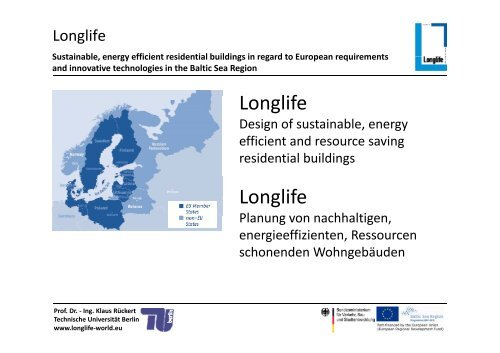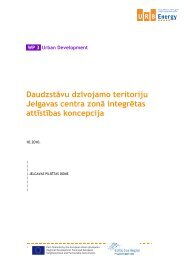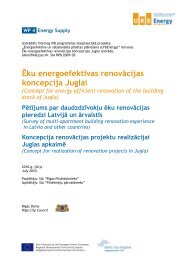L lifonge Longlife - URB.Energy
L lifonge Longlife - URB.Energy
L lifonge Longlife - URB.Energy
Create successful ePaper yourself
Turn your PDF publications into a flip-book with our unique Google optimized e-Paper software.
<strong>Longlife</strong><br />
Sustainable Sustainable, energy efficient residential buildings in regard to European requirements<br />
and innovative technologies in the Baltic Sea Region<br />
Prof. Dr. ‐ Ing. Klaus Rückert<br />
Technische Universität Berlin<br />
www.longlife‐world.eu<br />
L<strong>Longlife</strong> lif<br />
Design of sustainable, energy<br />
efficient ffi i and d resource saving i<br />
residential buildings<br />
<strong>Longlife</strong><br />
Planung von nachhaltigen<br />
nachhaltigen,<br />
energieeffizienten, Ressourcen<br />
schonenden Wohngebäuden
<strong>Longlife</strong><br />
Introduction<br />
Challenges<br />
� Climate changes<br />
Objectives � EU – resolution: reducing energy<br />
consumption 20% till 2020<br />
Project & Partners<br />
Method<br />
Output<br />
Outlook<br />
Prof. Dr. ‐ Ing. Klaus Rückert<br />
Technische Universität Berlin<br />
www.longlife‐world.eu<br />
�� Transnational cooperation in countries<br />
of the Baltic Sea Region
<strong>Longlife</strong><br />
Introduction<br />
Challenges<br />
Objectives � Guidelines<br />
Project & Partners<br />
Method<br />
Output<br />
Outlook<br />
Prof. Dr. ‐ Ing. Klaus Rückert<br />
Technische Universität Berlin<br />
www.longlife‐world.eu<br />
� <strong>Energy</strong> and Resource saving<br />
� Consideration of life cycle of building<br />
� Harmonization of standards<br />
� Prototype building<br />
� <strong>Longlife</strong> Performance Pass ©<br />
� <strong>Longlife</strong> Performance Pass ©<br />
� Sh Sharing i kknowledge l d and d ttechnology h l<br />
� International cooperation
<strong>Longlife</strong><br />
Structure of project<br />
Introduction<br />
Challenges<br />
Objectives<br />
Project & Partners<br />
Method<br />
Output<br />
Outlook<br />
Prof. Dr. ‐ Ing. Klaus Rückert<br />
Technische Universität Berlin<br />
www.longlife‐world.eu
<strong>Longlife</strong><br />
Introduction<br />
Challenges<br />
Objectives<br />
Project & Partners<br />
Method<br />
Output<br />
Outlook<br />
Prof. Dr. ‐ Ing. Klaus Rückert<br />
Technische Universität Berlin<br />
www.longlife‐world.eu
<strong>Longlife</strong><br />
Structure of project<br />
Introduction<br />
Challenges<br />
Objectives<br />
Project & Partners<br />
Method<br />
Output<br />
WP 3:<br />
Analysis and<br />
Comparison<br />
Team 1, 2, 3<br />
WP 1: Management and Administration<br />
WP 4:<br />
Development of<br />
standards,<br />
criteria and<br />
Specifications<br />
WP 5:<br />
Prototype design<br />
Team 1, 2, 3 Team 1, 2, 3<br />
Pilot<br />
Projects<br />
Outlook WP 2: Communication and Information<br />
Prof. Dr. ‐ Ing. Klaus Rückert<br />
Technische Universität Berlin<br />
www.longlife‐world.eu
<strong>Longlife</strong><br />
Process of project<br />
Introduction<br />
Challenges<br />
Objectives<br />
Project & Partners<br />
Method<br />
Output<br />
Outlook<br />
Prof. Dr. ‐ Ing. Klaus Rückert<br />
Technische Universität Berlin<br />
www.longlife‐world.eu
<strong>Longlife</strong><br />
Workshops<br />
Introduction<br />
Challenges<br />
Objectives<br />
Project & Partners<br />
Method<br />
Output<br />
Outlook<br />
Prof. Dr. ‐ Ing. Klaus Rückert<br />
Technische Universität Berlin<br />
www.longlife‐world.eu<br />
Kick-off conference Berlin<br />
Germany<br />
Workshop Gdansk Workshop Vilnius<br />
Poland<br />
Lith Lithuania i
<strong>Longlife</strong><br />
Analysis and comparison<br />
Introduction<br />
Challenges<br />
Objectives<br />
Project & Partners<br />
Method<br />
Output<br />
Outlook<br />
Prof. Dr. ‐ Ing. Klaus Rückert<br />
Technische Universität Berlin<br />
www.longlife‐world.eu<br />
WP 3: Analysis and comparison<br />
3.1<br />
Engineering and<br />
building technology<br />
standards – Team 1<br />
3.2<br />
Administration procedures,<br />
licensing g rules, , tendering g<br />
rules, laws – Team 2<br />
3.3<br />
Economical and<br />
financial basis – Team 3<br />
3.4<br />
Virtual project room<br />
� analysis and comparison of engineering<br />
and technology standards in partner countries<br />
� comparisons and investigations of<br />
administration procedures, building permit rules,<br />
tendering te de g rules u es and a d laws a s in the t e participating pa t c pat g cou countries t es<br />
� provide a general and a specific overview<br />
about economical and financial issues;<br />
sustainability and quality aspects in the<br />
participating countries<br />
� provide an access to the project’s work results<br />
and documents for all project partners
<strong>Longlife</strong><br />
Glossary<br />
Introduction<br />
Challenges<br />
Objectives<br />
Project & Partners<br />
Method<br />
Output<br />
Outlook<br />
Prof. Dr. ‐ Ing. Klaus Rückert<br />
Technische Universität Berlin<br />
www.longlife‐world.eu
<strong>Longlife</strong><br />
Questionnaire<br />
Introduction<br />
Challenges<br />
Objectives<br />
Project & Partners<br />
Method<br />
Output<br />
Outlook<br />
Prof. Dr. ‐ Ing. Klaus Rückert<br />
Technische Universität Berlin<br />
www.longlife‐world.eu<br />
3.3 Economical energy supply<br />
Question Denmark Germany Lithuania Poland Russia Summary Benchmarks<br />
3.3.2<br />
How was the<br />
development of<br />
energy costs for<br />
private household<br />
(incl. TAX) within the<br />
last few years?<br />
The energy The energy Average heating The energy Average While the Because of the<br />
consumption prices rose in cost in 2008 y. prices increased heating cost in development of rising prices it is<br />
for heating has the last years. was 51,47 in the last years. 2007 y. was 0.27 energy prices necessary to<br />
fallen 28,6% If in 1998 a kWh €/MWh, but Average cost of €/ m². Average was quite stable save energy: on<br />
from 1980 to of electricity heating net heating in 1998 cost of central in Denmark, one hand by<br />
2007. Prices per costs 15.48 cost 60,65 ‐ 0,04€/kWh , in heating in 2009‐ prices rose changing our<br />
energy unit Cent, then in €/MWh. 2007 ‐ 0,31€/ m². remarkably in consumer<br />
have been quite 2008 the Average cost of 0,07€/kWh<br />
Germany (40% attitude and on<br />
stable the last amount was on central heating<br />
in 10 years) and the other hand<br />
couple of years. average 21.43 in 2000 ‐ 0,03<br />
in Lithuania by building<br />
Cent Cent. €/kWh €/kWh, in 2008<br />
(66% in 8 years). years) houses with less<br />
‐ 0,05 €/kWh.<br />
energy<br />
requirement.
<strong>Longlife</strong><br />
Analysis and comparison<br />
Introduction<br />
Challenges<br />
Objectives<br />
Project & Partners<br />
Method<br />
Output<br />
Outlook<br />
Prof. Dr. ‐ Ing. Klaus Rückert<br />
Technische Universität Berlin<br />
www.longlife‐world.eu
<strong>Longlife</strong><br />
WP4 – Development of standards and requirements<br />
Introduction<br />
Challenges<br />
Objectives<br />
Project & Partners<br />
Method<br />
Output<br />
Outlook<br />
Prof. Dr. ‐ Ing. Klaus Rückert<br />
Technische Universität Berlin<br />
www.longlife‐world.eu<br />
WP 4: Development of standards, criteria and specifications<br />
4.1<br />
Engineering and building<br />
technology standards –Team 1<br />
4.2<br />
Administration procedures, procedures<br />
licensing rules, tendering<br />
rules, laws –Team 2<br />
4.3<br />
Economical and financial<br />
basis – Team 3<br />
� development of normative rules, codes and<br />
requirements for planning and building<br />
new residential buildings<br />
� common development of methods and rules for<br />
administrative procedures and laws, tenders and<br />
licensing in an ideal common planning situation which<br />
can be used with no or at least only small changes in<br />
all partner countries (and eventually in all EU countries)<br />
� formulation of normative requirements for sustain‐<br />
ability and energy‐efficiency aspects with impact on<br />
currentbuilding practice; quality aspects in building<br />
material selection and economical energy supply<br />
under the aspects of influence on costs
<strong>Longlife</strong><br />
<strong>Longlife</strong> Decision Tool<br />
Introduction<br />
Challenges<br />
Objectives<br />
Project & Partners<br />
Method<br />
Output<br />
Outlook<br />
Prof. Dr. ‐ Ing. Klaus Rückert<br />
Technische Universität Berlin<br />
www.longlife‐world.eu
<strong>Longlife</strong><br />
WP4 – Development of standards and requirements<br />
Introduction<br />
Challenges<br />
Objectives<br />
Project & Partners<br />
Method<br />
Output<br />
Outlook<br />
Prof. Dr. ‐ Ing. Klaus Rückert<br />
Technische Universität Berlin<br />
www.longlife‐world.eu<br />
<strong>Longlife</strong> g<br />
Report 2
<strong>Longlife</strong><br />
WP 5<br />
Introduction<br />
Challenges<br />
Objectives<br />
WP 5:<br />
Project & Partners Prototype design<br />
Method<br />
Output<br />
Outlook<br />
Prof. Dr. ‐ Ing. Klaus Rückert<br />
Technische Universität Berlin<br />
www.longlife‐world.eu<br />
�����������<br />
��������������<br />
�� � �� �<br />
O 5.1 approval technical design documents for prototype<br />
in consideration of defined standards, criteria and<br />
specifications from WP 4.<br />
O 5.2 complete administrative, permit and tender<br />
documents for the prototype project<br />
O 5.3 financing, maintenance and operation models<br />
which can be used by authorities, banks, investors<br />
and owners<br />
O 5.4 concept for territorial development and financial<br />
instruments to develop regions and specific projects<br />
O 5.5 models for operating and monitoring the pilot<br />
and subsequent real projects<br />
O 5.6 concept for a "building pass / certificate of<br />
sustainability" to describe the properties of a building
<strong>Longlife</strong><br />
<strong>Longlife</strong> Design Class<br />
Introduction<br />
Challenges<br />
Objectives<br />
Project & Partners<br />
Method<br />
Output<br />
Outlook<br />
Prof. Dr. ‐ Ing. Klaus Rückert<br />
Technische Universität Berlin<br />
www.longlife‐world.eu<br />
� Number of floor levels 4<br />
� Number of apartments 12 –16<br />
� Benchmark: < 40 kWh/m2/a<br />
� Size of the apartments<br />
� 2‐room, 2 room, approx. 45 ‐ 60 m² m<br />
� 3‐room, approx. 75 ‐ 80 m²<br />
� 4‐room, approx. 85 ‐ 100 m²
<strong>Longlife</strong><br />
<strong>Longlife</strong> Design Class ‐ 11. Price<br />
Introduction<br />
Challenges<br />
Objectives<br />
Project & Partners<br />
Method<br />
Output<br />
Outlook<br />
Prof. Dr. ‐ Ing. Klaus Rückert<br />
Technische Universität Berlin<br />
www.longlife‐world.eu<br />
Design for sustainable residential buildings
<strong>Longlife</strong><br />
Measurement<br />
Introduction<br />
Challenges<br />
Objectives<br />
Project & Partners<br />
Method<br />
Output<br />
Outlook<br />
100<br />
%<br />
80<br />
%<br />
60<br />
%<br />
40<br />
%<br />
20<br />
%<br />
0 %<br />
BREEAMM<br />
Prof. Dr. ‐ Ing. Klaus Rückert<br />
Technische Universität Berlin<br />
www.longlife‐world.eu<br />
BREEAMM<br />
LEED<br />
CASBEEE<br />
Green Star S<br />
BCA Greeen<br />
BCA Greeen<br />
DGNB
<strong>Longlife</strong><br />
<strong>Longlife</strong>’s <strong>Longlife</strong> s focus<br />
Introduction<br />
Challenges<br />
Objectives<br />
Project & Partners<br />
Method<br />
Output<br />
Outlook<br />
Prof. Dr. ‐ Ing. Klaus Rückert<br />
Technische Universität Berlin<br />
www.longlife‐world.eu
<strong>Longlife</strong><br />
Efficiency of life‐cycle‐cost<br />
life cycle cost<br />
Introduction<br />
Challenges<br />
Objectives<br />
Project & Partners<br />
Method<br />
Output<br />
Outlook<br />
100%<br />
80%<br />
60%<br />
40%<br />
20%<br />
0%<br />
Prof. Dr. ‐ Ing. Klaus Rückert<br />
Technische Universität Berlin<br />
www.longlife‐world.eu<br />
� <strong>Energy</strong> Efficiency<br />
� Life Cycle Costs of Building<br />
1 22 33 44 5 6 7 8<br />
planning costs<br />
construction<br />
costs<br />
operation costs<br />
Standard<br />
<strong>Longlife</strong><br />
end of<br />
life costs
<strong>Longlife</strong><br />
Conclusion<br />
Introduction Comparison investment and operational costs<br />
Challenges<br />
Objectives<br />
Project & Partners<br />
Method<br />
Output<br />
Outlook<br />
Prof. Dr. ‐ Ing. Klaus Rückert<br />
Technische Universität Berlin<br />
www.longlife‐world.eu<br />
BASHDA‐ Baltic Sea Housing Development Association
<strong>Longlife</strong><br />
Introduction<br />
Challenges Prof. Dr. ‐ Eng. Klaus Rückert<br />
Berlin University of Technology<br />
Objectives<br />
Sekretariat A 16<br />
Project & Partners Strasse des 17. 17 Juni 152<br />
10623 Berlin, Germany<br />
Method<br />
Output<br />
Outlook<br />
Prof. Dr. ‐ Ing. Klaus Rückert<br />
Technische Universität Berlin<br />
www.longlife‐world.eu<br />
www.tek.tu‐berlin.de<br />
www www.longlife‐world.eu<br />
longlife world eu




